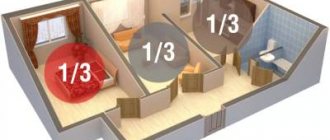6
The death of a loved one is a great grief for relatives, friends and acquaintances. After the death of the owner, property remains, which must pass to his legal successors. When transferring property rights, the degree of relationship, property regime, timing of contacting a notary, and the presence/absence of a will are taken into account. The most popular type of inheritance is a share in the privatized apartment of the deceased. However, the “housing issue” gives rise to disputes, disagreements, claims and attacks from relatives. It gets to the point that relatives cannot share one apartment for several years. Is it so easy to inherit a share in a privatized apartment? Let's analyze the legal and everyday side of the issue from the position of legislation.
Will
The only way for a citizen to dispose of acquired material assets is to draw up a will. He can transfer to his heirs any property that is legally owned, including a share of the apartment. If the document is drawn up without defining the shares of each of the legal successors, then according to the generally accepted position they are distributed in equal parts among all applicants. It can be argued that this is the simplest option in inheritance relations, since the wishes of the deceased are clearly expressed. However, a number of provisions of Russian legislation are aimed at limiting the will of the testator. This is due to ensuring the interests of people with low social security; a mandatory share belongs to such a legal institution.
Persons eligible to receive it are:
- Children under eighteen years of age.
- Parents or husband/wife of the testator who are unable to work due to age or illness.
- Citizens who were dependent on the deceased.
All of the above receive no less than half of the portion due to them upon legal inheritance.
The testator can also make a testamentary refusal for legal successors who are such by virtue of law or will. For example, order to provide a certain person, while he is alive, with the use of living space received as an inheritance.
In this case, after the death of the owner, the legatee has the right to demand the execution of the order made by the deceased during his lifetime, regardless of the heir’s personal need for the received housing.
Deadlines for applying for registration of inheritance rights
The legislation allocates six months for the procedure for accepting an inheritance (Article 1154 of the Civil Code of the Russian Federation). During this period, the applicant must declare his right or renounce his share in the apartment.
The countdown begins from the moment of death of the previous owner. The law provides for a procedure for extending the period for applying for an inheritance. To do this, the citizen must provide evidence of valid reasons for missing the pass.
There are two ways to restore the right to a share of property:
- By mutual agreement with other heirs.
- In court.
It is necessary to apply for an extension no later than six months after the day on which the successor learned about the opening of the inheritance.
Who inherits by law
The Civil Code identifies eight inheritance lines. The basis is the principle of succession of each subsequent queue, when there are no applicants in the previous one. This happens in the event of their absence or deprivation of the opportunity to act as legal successors, as well as in the case of refusal to accept the inheritance. As a general rule, property is registered as ownership in equal parts. The order depends on the degree of relationship. The first includes the husband/wife, children (natural and adopted) and parents of the deceased. To classify a spouse into this category, it is necessary to have an officially registered relationship valid until the day of death. Otherwise, it is considered that the joint property was divided during the divorce. The next line includes the testator’s sisters and brothers, his grandparents (we are talking about grandparents). The rest are arranged according to the degree of remoteness of relationship. Thus, the seventh group consists of citizens who are not related to the deceased by blood ties (stepdaughters or stepsons). Inheritance of a share in an apartment by legal successors occurs according to general rules, that is, in equal parts.
Inheritance by fact
This type of entry into one’s rights as an heir implies simply using the property of the testator, without legal registration. As a rule, this type of “inheritance” is practiced in cases where we are talking about a non-privatized apartment.
This method has a number of significant disadvantages:
- The share cannot be sold, exchanged, or used as collateral.
- Part of the apartment cannot be bequeathed or transferred to your heirs by law.
- Officially, a share in an apartment cannot be rented out.
In other words, no legal transactions can be carried out with the property. The heir can simply use it.
How to register succession
To enter into an inheritance, regardless of the grounds, you must follow the established procedure.
To do this, perform the following actions:
- To obtain a certificate of inheritance, an application of a certain sample is submitted to the notary. This can be done in person, through a representative with a power of attorney issued in his name.
- Actual possession and use of property; measures aimed at its preservation and expenses incurred in connection with this will confirm the acceptance of succession.
To register an apartment by inheritance, you must provide the following to the notary office:
- The death certificate is obtained from the registry office (civil registry office).
- Documents confirming blood relationship or relationship with the deceased.
- Extract from Rosreestr about real estate.
- A paper from the management organization confirming that there is no debt for utilities and housing services.
The notary has the responsibility to establish the degree of relationship among persons applying for legal succession.
Evidence includes documents from the registry office, court decisions and, if available, extracts from birth and house registers, certificates from the place of work.
We recommend that you read:
Inheritance of real estate after the death of a relative
Privatization and inheritance of an apartment
Privatization is the free registration of an apartment into private ownership, which was previously provided by the state under a social tenancy agreement.
In the process of inheriting privatized housing, it is necessary to take into account that privatized objects are the personal property of a citizen. That is, it is subject to the rules established for personal property. The spouse of the deceased cannot claim the spousal share.
Possible options:
- The apartment was privatized by the testator alone. In this situation, he is the sole owner of the residential premises, even if he was married at the time of privatization. After his death, the apartment is fully included in the inheritance property.
- The apartment was privatized by several owners. In this case, the inheritance includes only the share that belonged to the deceased.
In order for an apartment to become part of the inherited property, it is necessary for the testator to complete the privatization procedure and register ownership in Rosreestr. Otherwise, the heirs will have to deal with the re-registration themselves.
By will
To register the rights to the deceased’s apartment under a will, you must:
- Contact any notary office in the country with the death certificate of the deceased to find out whether a will was drawn up.
- Find out where exactly it is stored.
- Visit the notary's office where the will is kept.
The right to register an apartment as an inheritance is given to the persons specified in the will. The testator can assign the premises to relatives, friends, strangers, legal entities or the state.
Without a will
If the deceased owner has not executed a will, then the property of the deceased passes according to law. In this case, only relatives of the testator can claim the apartment.
The Civil Code establishes 7 lines of heirs. Each successive successor can claim the property only in the absence or refusal of all heirs of the previous order.
First of all, the official spouse of the deceased, children, parents, and adoptive parents are included. If the testator had dependents at the time of death (supported relatives, wards, disabled cohabitant), then they can claim a share in the property on an equal basis with other recipients.
According to the law, the apartment is divided between recipients in equal shares. That is, if there are five heirs, then each of them has the right to 1/5 share.
Who has priority in registering a share in the inheritance?
According to regulations, after the death of the owner, the property belonging to him in evenly proportional parts passes to the heirs. The division of material assets that are common shared property can be carried out no later than 3 years from the date when the inheritance was opened.
As for real estate, it is possible to carry out such actions only after receiving a certificate of inheritance.
Provided that the living space cannot be divided in actual size, the following have the right of priority to receive it on account of their personal share:
- Citizens, co-owners of the deceased, regardless of legal successors, who lived with the testator in the same premises, regularly used it, but were not the owners of the property in question.
- The legal successors, although they did not have a common right to housing with the deceased, used it regularly until the day of his death. Provided that the use of the premises was carried out legally.
- Citizens who lived with the testator constantly until the day of death. Provided that they do not own any other residential premises or have a lease agreement.
The legal successor who acquired the property on this basis must pay compensation to the other heirs for their share of the property.
Registration cost
For the above actions you will have to pay a state fee. Everything will depend on two factors: the value of the share and the order of inheritance.
If we are talking about priority citizens, then they are required to pay 0.3 percent of the cadastral value of the share. If the queue is lower than the first, then 0.6 percent.
Tax
If a residential property is inherited, then it is not subject to personal income tax in accordance with the Tax Code
Property valuation
As a rule, in these situations cadastral indicators are taken into account. However, market value can also be taken into account. Property valuation is carried out directly by a notary with the involvement of third-party competent organizations. The amount spent on the appraisal is evenly distributed among everyone who wishes to inherit.
How will privatized housing be inherited?
Inheritance of a share in a privatized apartment occurs according to established rules. The deceased's share is divided in equal parts among the remaining participants in the common property. Nuances in the succession process may arise in the presence of a marriage relationship. So, if an apartment was privatized by both spouses, it is in joint ownership. According to legal norms, the marital share of property is half of the joint property. Regardless of the presence or absence of a will, the husband/wife will receive their share upon succession. If the testator, during his lifetime, in a formalized will, transferred to someone a jointly owned share that belonged to the other half, then this clause of the will is void. Provided that the property was privatized before marriage, the spouse inherits on a general basis, that is, the shares are divided in equal parts among the remaining legal successors. However, one should take into account the fact that the rules of privatization in Russia changed several times, for example, at one of the time periods there was a provision according to which living space was transferred free of charge to citizens in an amount not exceeding the established norms, and square meters in excess of the limit were subject to redemption. In the presence of such a situation, it becomes possible for the heir to increase his share of material assets during succession.
For example:
Citizen V.N. appealed to the court. Avdeeva. In the statement of claim, she asked to recognize the disputed living space as joint property and to increase the size of her share in the privatized apartment left after the death of her husband G.G. Avdeeva to 2/3.
She justified her demands with the following arguments:
- G.G. Avdeev privatized housing for himself while he was legally married.
- According to the current regulations, square meters exceeding the established standards were purchased from the municipality at the expense of the spouses’ common funds.
We recommend that you read:
Inheritance of a privatized apartment without a will
G.G.’s daughter objected to this. Avdeeva, A.A. Lyapnigov. The latter explained that her father lived in the apartment under a social security agreement. rented before marriage, after marriage he privatized housing in his name and received a certificate of ownership. Since privatization implies the gratuitous transfer of property, citizen Avdeeva is not a participant in joint ownership. The amount paid for excess living space is not comparable to the price for square meters transferred free of charge. Thus, according to Lyapnigova, Avdeeva does not have a marital share in the apartment according to the law. Based on this, she asks that the apartment, after her father’s death, be divided between her and Avdeeva in equal parts.
However, the court agreed with the arguments of V.N. Avdeeva and satisfied the claim in full, since square meters in excess of the established limit were acquired at the expense of the spouses’ common funds and, accordingly, belong to jointly acquired property.
The question often arises of how to get a share in a non-privatized apartment. Here everything will depend on whether the deceased intended to enter into an agreement for the gratuitous transfer of living space into ownership. For obvious reasons, a notary will refuse to issue an inheritance certificate for a non-privatized apartment. Therefore, the problem can only be resolved in court.
Evidence of intention to carry out the privatization process will be:
- Submitted an application to the appropriate authority.
- Submitted package of documents.
- Failure to withdraw the application.
In other words, a person dies before the real estate is registered as a property. If all conditions are met, the property will be included in the estate. Persons who lived together with the deceased and were related to him have the opportunity to contact the municipality with a request to conclude a social contract. hiring Based on the latter, housing is privatized.
Features of share inheritance:
If the share in common joint property
The procedure for inheriting jointly acquired property differs from the standard procedure. Much depends on the nature of the property rights to the share. If it was received in marriage, the widower/widow will be able to register 1/2 of the share + part of the share due to the spouse of the deceased as the primary heir.
It happens that a privatized apartment is registered as joint ownership (not necessarily of spouses). The heirs can agree on a change in the legal regime - in this case, joint property will become shared property.
The relatives of the deceased will receive an ideal share, expressed as a percentage or in the form of a separate room - living space. In the future, the heir will be able to dispose of the share at his own discretion: sell, donate, exchange, pledge, bequeath...
If a stranger is registered in the apartment
If a stranger is registered in an inherited apartment, he can be deprived of his housing rights by filing a claim for eviction and deregistration.
However, if the specified person belongs to the category of citizens who had equal rights with the owner of the apartment and voluntarily refused privatization, then they retain a lifelong right to use housing . This position is adhered to by the Supreme Court (Determination of the Supreme Court of the Russian Federation dated 02/04/2014 No. 46-KG13-6).
It will not be possible to discharge a refusenik even after registration of ownership of the property. But, if a citizen does not live in an apartment for a long time, then he loses the right to use the property.
The same applies to residential tenants - until the lease agreement comes to an end, the tenants cannot be evicted. Read about in what cases and how to evict tenants from a rental apartment?
If there are no contenders for a share
It happens that there are no heirs to the property.
This happens in the following situations:
- refusal of inheritance by applicants - by law and by will;
- deliberate disregard for accepting the inheritance within the period established by law;
- missing the 6-month deadline;
- recognition of heirs as unworthy;
- lack of claimants for property.
If no one has accepted a share in the privatized apartment, it will go to the state as escheat property. The primary heir is the municipality in charge of the house. Most likely, the share will be offered to other co-owners of the apartment, and if they refuse to buy it, the inherited part of the housing will go at auction.
Is it possible to increase part of the property in inheritance?
In some cases, it is possible to increase the share in an apartment by inheritance. To do this, it will be necessary to prove that during the life of the testator, the value of the real estate owned was increased by inseparable improvements carried out at the expense of funds belonging to the successor. There are criteria that allow you to determine what changes in the object will lead to an increase in the share.
These include the following works:
- Aimed at major repairs of structural elements (for example, replacing the roof, rafters, raising the foundation, repairing load-bearing walls).
- Leading to an increase in the area of the home (extension).
- Made in compliance with sanitary and construction standards.
- Produced with the consent of all co-owners.
Example:
Citizen G.A. Yagutova. filed a claim to increase her share in the inheritance after her deceased husband A.N. Yagutova. From the circumstances of the case it followed:
- The disputed apartment does not belong to the jointly acquired property of the spouses. The owner under the purchase and sale agreement dated 2005 was A.N. Yagutov.
- In 2010, the Yagutovs made expensive renovations and purchased built-in furniture.
- In 2013 A.N. Yagutov died, his mother A.S. inherited the apartment. Razumovskaya and wife G.A. Yagutov, part of each was 4/8.
G.A. Yagutova believes that the repairs made significantly increased the value of the inherited property, and on the basis of this she asks that her share be determined in the amount of 6/8.
The court did not satisfy the claim, pointing out the following circumstances: the repairs made by the spouses were cosmetic and aimed at maintaining the property in proper condition, which is the responsibility of the owners. Furniture, regardless of its cost, is not an inseparable improvement.
Taxes
According to Federal Law No. 78 of July 1, 2005, no tax is charged when inheriting residential real estate. But, you will need to pay a state fee:
- 0.3% of the estimated cost of housing for first-stage heirs, but not more than 100,000 rubles.
- 0.6% of the cost of housing for heirs of the second and subsequent stages, but not more than 1 million rubles.
Please note that the state fee is paid by each of the heirs.
Persons who, in addition to inheriting a share in an apartment, also receive the right to receive income from the inventions or works of a deceased testator, pay a tax of 13% of the appraised value of the apartment.
Common shared ownership
In this case, the property belongs to several persons at the same time. Moreover, everyone has the right to a certain part of the total.
The reasons for the emergence of this type of ownership may be the joint acquisition or production of products, the implementation of agricultural or farming activities, the construction of a house, the purchase or privatization of an apartment. At the same time, everyone’s share is initially determined. This is established by agreement of the interested parties. In this case, the parties can determine that the sizes of the parts are established depending on the contribution of each. If this is not established, then the shares of the participants are considered equal.
At the same time, a person who has made inseparable improvements to the property at his own expense is given the opportunity to increase his share. Any disputes regarding the size of shares are resolved through negotiations or in court.
Increasing share size
In some cases, the size of the share can be increased if there is evidence that, at the expense of one of the legal successors, actions were taken to increase the value of the property.
For example, citizen K had a house before marriage; after the wedding, some construction work was done at his wife’s expense, which doubled the market value of the home. By inheritance, she received a third of the house, since her late husband had two more children from another marriage. As part of the trial, it was revealed that it was the work performed that contributed to the increase in the cost of housing, and the woman was assigned a 50% share of the house, and the rest was divided among the children.
When the heir becomes the owner
According to general rules, a person acquires ownership of property from the moment of registration of such opportunity. However, the legislation makes some exceptions in relation to certain types of material assets. This also applies to inherited apartments. That is, the method of obtaining property matters. If it was transferred by inheritance. In this case, the new owner’s right arises from the moment the inheritance is opened, that is, from the moment of the death of the owner of the property. In this case, the date of actual acceptance of the apartment and the entry of information into Rosreestr do not play a role.
Preemptive right to purchase a share
A person who owns a share in an apartment or house has the right to dispose of it and, in particular, to sell it. In general, anyone can be a buyer, but first of all, this opportunity is offered to those who have a preemptive right:
- co-owners of real estate permanently residing in the apartment;
- persons living indoors and having no other place to live.
For them, the share is offered at the market price; if they refuse, then the owner of the share has the right to sell it to any person.
Read also: How to discharge a deceased person from an apartment
Healthy! The procedure for inheriting a house and an apartment has few differences. However, in the first case, as a rule, the land plot with buildings is also inherited, which complicates the division into shares.
Is it possible to register an inheritance if there are debts on an apartment?
An apartment can be inherited even if the deceased has debt obligations that he did not have time to fulfill. This could be repaying a bank loan or paying utility bills. If such debts were incurred during the life of the deceased, then the obligation to reimburse them will be assigned to the legal successors. In this case, the amount of each heir will be equal to the part of the property due.
It should be noted that each potential recipient has every right to refuse the apartment left by the deceased. In this case, he relieves himself of the burden of answering for debt obligations.
But even in such a situation there may be exceptions. For example, if the heir acted as a guarantor under an agreement for the deceased to receive a bank loan, which was spent on purchasing an apartment, and the funds were not returned in full, then the successor will be obliged to repay the debts, even if there is a refusal of the inheritance.
Who will get the apartment after the death of the owner if there is no will?
The property of the deceased is inherited by law or by will. A will is a testator's order for the distribution of property and rights after death. It is not mandatory and is drawn up voluntarily. If it is not there, then the inheritance is distributed among the relatives of the deceased according to the law .
Attention
It is important to remember that you can only accept the entire inheritance due . If there is any encumbrance on the apartment, for example, a mortgage, then entering into inheritance entails the assumption of corresponding obligations.
, relatives and disabled dependents have the right to inheritance . They are called to inherit by the notary who conducts the inheritance case. However, not all heirs have equal rights to inheritance: property is distributed in order and while there are heirs of a higher order, subsequent ones cannot inherit the apartment.
Inheriting an apartment by law: queues of heirs
According to Art. 1142-1145 of the Civil Code of the Russian Federation, the following lines of inheritance are legally established:
- First : parents and children, including adopted children, husband and wife of the testator.
- Second : grandparents, brothers and sisters, both full and half-blooded, i.e. having only one parent in common with the testator.
- Third : full and half brothers and sisters of the parents of the deceased - uncles and aunts.
- Fourth : great-grandparents.
- Fifth : cousins and granddaughters (children of their own nephews and nieces), great-aunts and grandfathers (sisters and brothers of their own grandparents).
- Sixth : children of fifth-order heirs and cousins.
- Seventh : stepsons, stepdaughters, stepfather and stepmother.
For your information
disabled dependents are identified as a “sliding” queue . They are called together with the heirs of the first stage, if there are none, then with the heirs of the second, and so on. If there are no other heirs, then the “sliding” ones are called up as the eighth line .
If an heir included in one of the first 3 stages died before the testator or on the same day as him , then the right to inheritance in equal shares passes to his children by right of representation. If the heir died after the opening of the inheritance and did not have time to accept, then the inheritance right passes to his heirs by law, with the exception of the right to an obligatory share.











